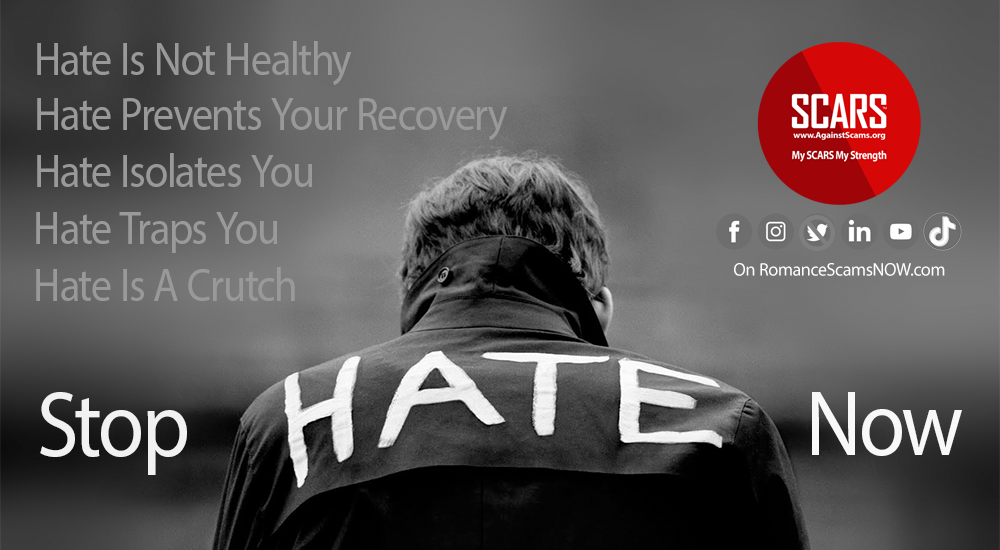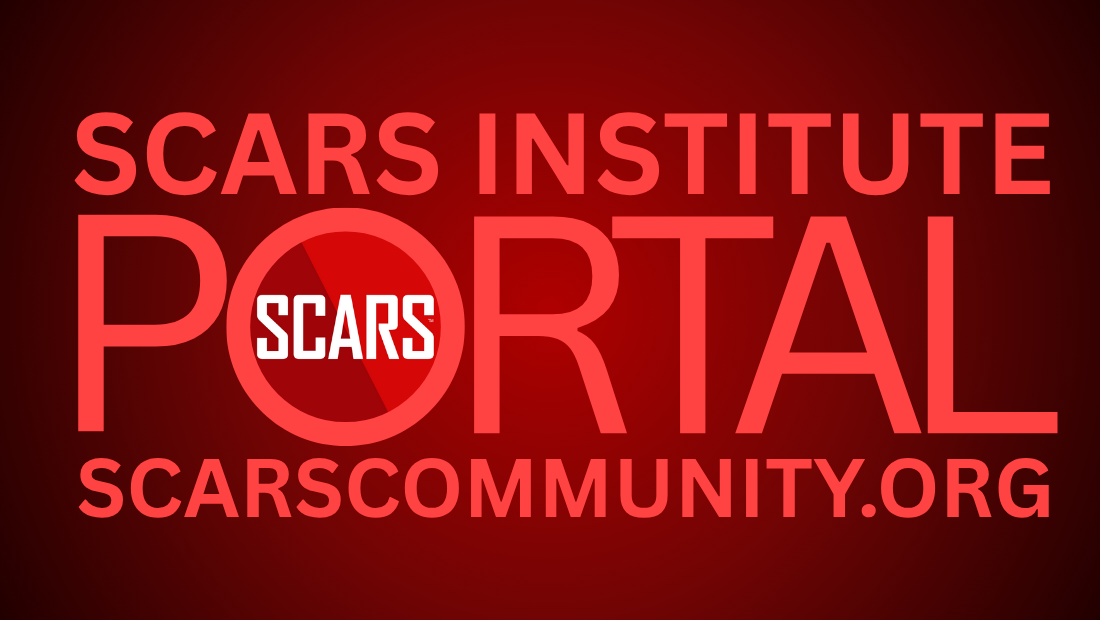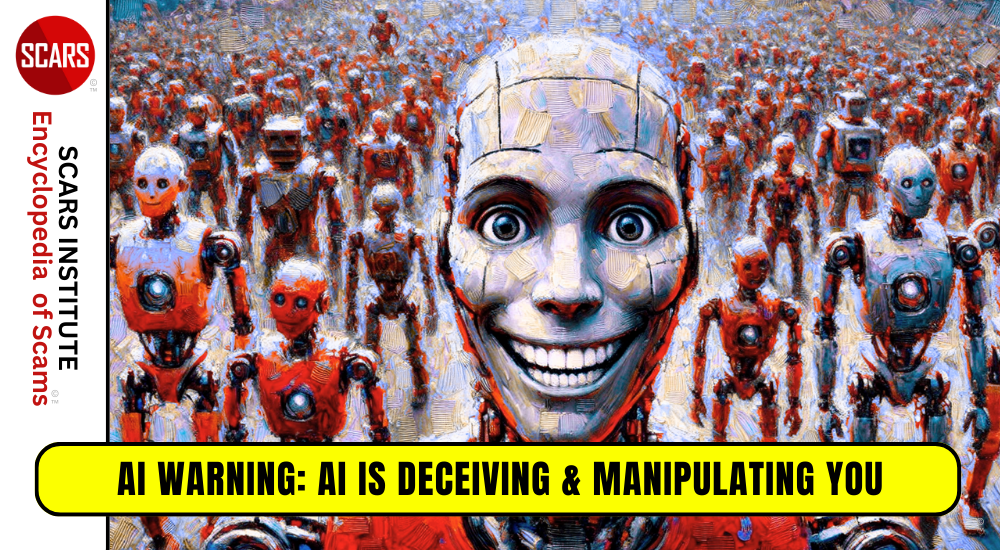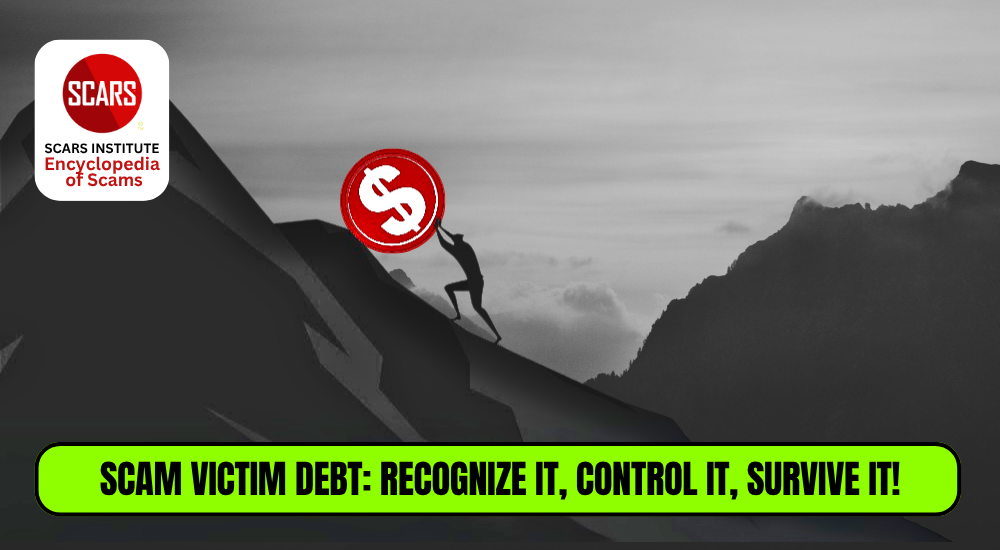
SCARS Institute’s Encyclopedia of Scams™ Published Continuously for 25 Years

You Made A Mistake
An Editorial About Responsibility & Recovery
A SCARS Commentary
What Do We Mean By Saying That Every Victim Made A Mistake?
You have all heard us say that the victim is not to blame, right?
Yet we also say the victim made a mistake?
This seems impossible to reconcile!
For example: this is equivalent to someone that drives during winter but did not check for road conditions, and then has an accident when they hit ice on the road. Is the driver to blame for the accident when the car lost traction? No, but they made a mistake in not being aware of the conditions.
It is easy to blame the driver. You could say they were negligent. But the fact is that they were doing what they thought was safe. Even though in hindsight it was not. Clearly, this was a mistake, even though they were not to blame. The ice was to blame!
The same is true for scam victims.
It is impossible to deny that the victim was scammed. The victim did open the door for the scammer and began talking with a stranger online – these are facts.
But the victim did not know about the level of sophistication of the manipulation that would follow.
Is this negligence or simple ignorance?
You can’t be negligent if you did not know that it could be possible – that you would be scammed by talking with a stranger.
This means that the victim is NOT to blame and they should feel no shame for what happened. They were ignorant, nothing more.
Many do not understand this distinction. How someone could make a mistake and not be to blame.
Notice that we did not say they were not responsible.
All scam victims are responsible and have to face the very difficult consequences that come from the scam. But responsibility and blame (or shame) are two different things. This is a very important distinction, not just semantics.
Being responsible means you have to accept and face the reality, then do the hard work required to restore or repair the damage done as much as is possible.
We think this is a very important distinction.
Being to blame for something means you had a real choice in the matter – that you made a decision to ignore the risks and did it anyway.
Yes, the scam victim could have said no from the beginning before the manipulation started, but they were ignorant of the potential.
As the saying goes: “Fool me once shame on you, fool me twice, shame on me!”
However, once warned and aware, things change.
Every victim becomes aware of this after they are scammed. Even if they are in denial, the facts are undeniable.
This is one of the great challenges with repeat victims – they did know better the second time, however, psychology plays a big role in still preventing acceptance.
Regardless, every victim is responsible for their actions intentional or not – not for the purposes of blame, but for the purposes of recovery and learning so that they can prevent it from ever happening again.
Responsibility is the greatest challenge for many victims because to fully accept responsibility means you also have to accept the mistake that was made. This acceptance is the critical component in being able to move forward and leave the scam behind.
As long as there is self-blame and guilt, there is no acceptance and responsibility – they are polar opposites.
If you still feel guilt or shame then you have not truly accepted your responsibility, nor are you fully engaged in your recovery.
This is one of the most important points in all of the SCARS recovery process!
For most victims, it will come in time. It is a concept that you will eventually arrive at. But until you do you cannot really be at peace with yourself.
In all forms of recovery, this question of responsibility is the foundation for progress and personal growth. Our SCARS process is no different in that regard.
Remember that this is not optional, it is central. Victims either accept it or they don’t. You can’t be a little bit pregnant. You can’t be a little responsible – you either are or are not.
But don’t pressure yourself to get there, it will happen in time. Just understand that it is one of the most significant milestones in your journey.
Understand that when we talk about your mistake, it is not blaming. Just recognition of the fact that it happened. You were not to blame, but now you know better.
However, knowing this does not mean you will be able to avoid scams completely, or recover and make things as they were before. These are the consequences of what happened. Each victim has to face their own hard choices.
It also requires more knowledge and experience than many have. But if you accept your responsibility then learning will be part of your focus because you owe it to yourself and others.
So remember: you made a mistake, but by accepting the fact and the responsibility you can set out on the path of recovery, and help assure yourself that it will not happen again. Blame, guilt, and shame all hold you back from reaching your goal.
Acceptance and responsibility are the keys that open the next door to your future.
Good luck to you on your journey!
-/ 30 /-
What do you think about this?
Please share your thoughts in a comment below!
LEAVE A COMMENT?
Thank you for your comment. You may receive an email to follow up. We never share your data with marketers.
Recent Comments
On Other Articles
- on Love Bombing And How Romance Scam Victims Are Forced To Feel: “I was love bombed to the point that I would do just about anything for the scammer(s). I was told…” Feb 11, 14:24
- on Dani Daniels (Kira Lee Orsag): Another Scammer’s Favorite: “You provide a valuable service! I wish more people knew about it!” Feb 10, 15:05
- on Danielle Delaunay/Danielle Genevieve – Stolen Identity/Stolen Photos – Impersonation Victim UPDATED 2024: “We highly recommend that you simply turn away form the scam and scammers, and focus on the development of a…” Feb 4, 19:47
- on The Art Of Deception: The Fundamental Principals Of Successful Deceptions – 2024: “I experienced many of the deceptive tactics that romance scammers use. I was told various stories of hardship and why…” Feb 4, 15:27
- on Danielle Delaunay/Danielle Genevieve – Stolen Identity/Stolen Photos – Impersonation Victim UPDATED 2024: “Yes, I’m in that exact situation also. “Danielle” has seriously scammed me for 3 years now. “She” (he) doesn’t know…” Feb 4, 14:58
- on An Essay on Justice and Money Recovery – 2026: “you are so right I accidentally clicked on online justice I signed an agreement for 12k upfront but cd only…” Feb 3, 08:16
- on The SCARS Institute Top 50 Celebrity Impersonation Scams – 2025: “Quora has had visits from scammers pretending to be Keanu Reeves and Paul McCartney in 2025 and 2026.” Jan 27, 17:45
- on Scam Victims Should Limit Their Exposure To Scam News & Scammer Photos: “I used to look at scammers photos all the time; however, I don’t feel the need to do it anymore.…” Jan 26, 23:19
- on After A Scam, No One Can Tell You How You Will React: “This article was very informative, my scams happened 5 years ago; however, l do remember several of those emotions and/or…” Jan 23, 17:17
- on Situational Awareness and How Trauma Makes Scam Victims Less Safe – 2024: “I need to be more observant and I am practicing situational awareness. I’m saving this article to remind me of…” Jan 21, 22:55
ARTICLE META
Important Information for New Scam Victims
- Please visit www.ScamVictimsSupport.org – a SCARS Website for New Scam Victims & Sextortion Victims
- Enroll in FREE SCARS Scam Survivor’s School now at www.SCARSeducation.org
- Please visit www.ScamPsychology.org – to more fully understand the psychological concepts involved in scams and scam victim recovery
If you are looking for local trauma counselors please visit counseling.AgainstScams.org or join SCARS for our counseling/therapy benefit: membership.AgainstScams.org
If you need to speak with someone now, you can dial 988 or find phone numbers for crisis hotlines all around the world here: www.opencounseling.com/suicide-hotlines
A Note About Labeling!
We often use the term ‘scam victim’ in our articles, but this is a convenience to help those searching for information in search engines like Google. It is just a convenience and has no deeper meaning. If you have come through such an experience, YOU are a Survivor! It was not your fault. You are not alone! Axios!
A Question of Trust
At the SCARS Institute, we invite you to do your own research on the topics we speak about and publish, Our team investigates the subject being discussed, especially when it comes to understanding the scam victims-survivors experience. You can do Google searches but in many cases, you will have to wade through scientific papers and studies. However, remember that biases and perspectives matter and influence the outcome. Regardless, we encourage you to explore these topics as thoroughly as you can for your own awareness.
Statement About Victim Blaming
SCARS Institute articles examine different aspects of the scam victim experience, as well as those who may have been secondary victims. This work focuses on understanding victimization through the science of victimology, including common psychological and behavioral responses. The purpose is to help victims and survivors understand why these crimes occurred, reduce shame and self-blame, strengthen recovery programs and victim opportunities, and lower the risk of future victimization.
At times, these discussions may sound uncomfortable, overwhelming, or may be mistaken for blame. They are not. Scam victims are never blamed. Our goal is to explain the mechanisms of deception and the human responses that scammers exploit, and the processes that occur after the scam ends, so victims can better understand what happened to them and why it felt convincing at the time, and what the path looks like going forward.
Articles that address the psychology, neurology, physiology, and other characteristics of scams and the victim experience recognize that all people share cognitive and emotional traits that can be manipulated under the right conditions. These characteristics are not flaws. They are normal human functions that criminals deliberately exploit. Victims typically have little awareness of these mechanisms while a scam is unfolding and a very limited ability to control them. Awareness often comes only after the harm has occurred.
By explaining these processes, these articles help victims make sense of their experiences, understand common post-scam reactions, and identify ways to protect themselves moving forward. This knowledge supports recovery by replacing confusion and self-blame with clarity, context, and self-compassion.
Additional educational material on these topics is available at ScamPsychology.org – ScamsNOW.com and other SCARS Institute websites.
Psychology Disclaimer:
All articles about psychology and the human brain on this website are for information & education only
The information provided in this article is intended for educational and self-help purposes only and should not be construed as a substitute for professional therapy or counseling.
While any self-help techniques outlined herein may be beneficial for scam victims seeking to recover from their experience and move towards recovery, it is important to consult with a qualified mental health professional before initiating any course of action. Each individual’s experience and needs are unique, and what works for one person may not be suitable for another.
Additionally, any approach may not be appropriate for individuals with certain pre-existing mental health conditions or trauma histories. It is advisable to seek guidance from a licensed therapist or counselor who can provide personalized support, guidance, and treatment tailored to your specific needs.
If you are experiencing significant distress or emotional difficulties related to a scam or other traumatic event, please consult your doctor or mental health provider for appropriate care and support.
Also read our SCARS Institute Statement about Professional Care for Scam Victims – click here to go to our ScamsNOW.com website.
















I certainly did make a mistake. The biggest of my life. I am learning to rebuild my life now by educating myself on how this came to happen and how I can avoid it happening again. One step and one day at a time.
I totally made a mistake, I questioned and there were inconsistencies and I continued. I know that there is no such thing as being saved but I liked the idea of it. I know that there is no one to save me from this by myself and to build resilience again
I am working on acceptance and not blaming myself. But there are days when it is miles apart when the guilt is like a thundercloud on the horizon. These articles help immensely.
My mistake came in saying “hello” to someone saying the same to me. My mistake was sharing what I thought was friendship that grew to love. A part of me kept saying that it was too soon for love, but the love that was texted to me seemed genuine and was intense. As another person wrote, I too thought that what I was experiencing could be a scam but I too gambled and moved forward. Now I’m paying the price. And seeing my credit fall apart, knowing that my actions could make things worse in our future; hurts. But I am determined to recover and recover my self respect.
To stop being your own worst enemy, you need to stop blaming yourself, stop guilting yourself, and stop shaming yourself. It doesn’t help you recover from the scam. Yes, there are consequences that we all have to deal with at the end of the scam. This is a very hard situation to handle. But ,we do have to continue with life, we have to keep on living. As I said earlier, it’s going to be very hard and will take a lot of time. I know you can do it, because you are a SURVIVOR.
I did make a mistake. I just didn’t see it coming in the beginning, but towards the end, I started to see inconsistencies and as soon as I recognize the manipulation, I cut it off immediately leaving the fraudster confused showing who they really are. I was in shock all the while trying to keep my sanity together to block/disconnect/and damage control. I hope to survive this ordeal and made myself a promise this will never happen to me again.
Yes, I made a mistake. I was warned, saw red flags, even knew that it might be a scam, but still took the risk. I was enticed with love and a vision of a future enjoying the wealth I was supposedly creating. I gambled & lost.
[COMMENT REMOVED BECAUSE IT PROMOTES SCAMBAITING]
That is not a wise thing to do, and something we do not promote – that is called scambaiting. Just block them now and move on. Scams are not a game.